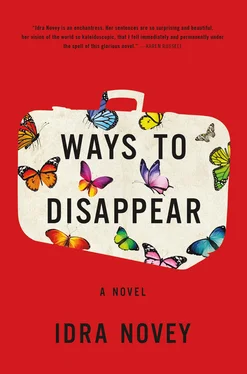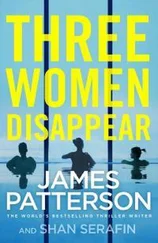She wished she’d brought along something with words on it, even an old magazine from the hotel. Besides her water and sunscreen, all she had in her bag was her notebook.
So she opened it.
In: Preposition. Used to indicate inclusion in a physical space or within something abstract or immaterial: in a panic, for example, or in a fantasy taking place while sitting between a sleeping pig and a pair of chickens, one of which has just relieved itself on the floor.

The fish moqueca. Emma felt it rising in her throat as soon as the ferry began to move. In one heave at the railing, she returned the fish to the sea.
Ai, Emma! Marcus grabbed her arm so she wouldn’t tip over the railing. You should drink some water. Come. He began to lead her toward the stairs up to the snack bar but Emma felt too queasy to climb them.
I’ll wait here, she said, flopping on a pile of emergency rafts. On the way to the island, she hadn’t noticed how often the ferry rocked beneath them, but she felt it now, every tiny rise and fall. It was possible, she recognized in her nauseous state, that she had nothing at all to offer in the search for her author. To avoid further embarrassment, she needed to book a flight home tomorrow. She’d call Miles and apologize for letting his emails go unanswered. They’d lived together this long, knew which mug the other preferred for coffee and which for tea. There was no reason she could not go with him to speak to caterers and commit to a wedding date.
Horizontal on the emergency rafts, her eyes closed, she was nearly convinced. She could be grateful for Miles and his steadiness. They would delight in exercise and recycling.
Then Marcus returned, leaning over her with a bottle of water still wet from where it had been submerged in ice. He asked if he should leave her to rest there a little longer and she knew that the appropriate answer was yes. But to reach his wrist was a matter of inches and there were her fingers, already trickling up his arm. To kiss her author’s son just once, atop a pile of emergency rafts, didn’t have to mean anything.
Unless she did it again.

And then again in the last row of the bus back to Rio.
And in the taxi from the bus terminal, in the brief darkness of the tunnel into Copacabana.
This will have to stop, she said.
As for Marcus, he left his hand where it was, between her legs.
Between: Preposition. 1.By the common action of but also used to designate a difference, a setting apart . 2.Used to indicate an interval .

At 4 a.m., Raquel stopped reading. She was two hundred pages into what was, or was not, the novel her mother had been working on when she staged her vanishing into the tree. Until this evening, Raquel had only gone into her mother’s poker accounts on the computer. She’d left the Word documents closed, but that had been before she’d been dragged, gagging, into a doorway. She was so tired that she had to read each sentence three times but knew she wouldn’t be able to sleep until she got to the end of it. The novel was set in the seventies, the pages alternating between the same two scenes again and again. In each telling, the scenes devolved into long stretches of random numbers and letters as if her mother had lost control of her hands, the pages filling with 3r#$T$)_4tg09NGJOP!@#)%$*PGM:-t-gtkltpjhhjIasd920-4tiu34-tu3y5-2y-u9jgdfpgj, and on and on.
It was the work of a broken person, somebody too bewildered by her own thoughts to punch in anything but nonsense. Both scenes were about a woman who’d graduated from a university in Rio in the early seventies, as Raquel’s mother had. The first scene took place at Cine Paissandu, the movie house where artsy types had brooded and commiserated during the dictatorship. In every version of the scene, something went wrong with the film: the reel broke or the sound system started to garble. While the audience waited for things to resume, the woman stepped into the alley behind the theater for a cigarette. The other smokers headed back inside, but she was too restless to join them. She sat down on the step for another cigarette in the alley, assuming she was alone.
But she wasn’t. There was a shadow. It drew closer and—
The sentence stopped, unfinished. After a page break, the same scene began again with the same woman alone in the same alley. Sometimes it took seven pages to get to the shadow, sometimes just a paragraph, but every time the shadow was about to reach the woman, her mother’s words came to an end.
In each version of the scene, things began identically, except the woman stepped into the alley wearing a blue linen dress instead of a cotton one. Or she was wearing a skirt. Or she’d placed her cigarette in her left hand instead of her right. As if it was only a matter of getting the right attire or placement of the cigarette to alter what happened next.
But the shadow kept approaching anyway, and the painfully precise descriptions of the woman’s clothing would continue, down to the square shape of the metal buttons on her blouse and the name of the maid who had pressed the shirt for her that morning, and then the shadow closed in, clamping his hand over her mouth, and the passage broke off again, unfinished.
The next page would be either another version or a different scene completely, set in Salvador da Bahia with what seemed like the same woman but married with a baby and on holiday. The three of them were sitting at a busy restaurant by the ocean. In every version of the second scene, the father banged his hand on the table and told the woman to stop gazing off. He ridiculed her for choosing a restaurant with such small portions and poor service — the sort of comments Raquel’s father had made in restaurants.
Or the man Raquel had assumed was her father. Especially after he died, people had remarked on how little she looked like him. Of course, they’d said the same about her mother. So who is it you look like? her friends’ parents always asked after seeing her next to her mother and Marcus. She’d always found it curious that her mother had married her father so quickly after meeting him and had taken his last name. Maybe it was to erase any doubts about his paternity.
Or maybe this half-finished story was fiction and only the details bore a resemblance to their family. For all Raquel knew, her mother’s drafts always broke off this way at difficult moments until her mother figured out what she wanted to do next. In the restaurant scene, just when it seemed as though the woman and her husband were about to have it out with each other, the woman would flee into some surreal description of the fish on her plate winking up at her with its oily eye, or of the man seated at the next table reading a yellowed newspaper from seventy-three years ago. Or her mother would simply write CHECK ON THIS, as if the date of the newspaper or the kind of fish staring up at the woman from her plate mattered tremendously.
Raquel rubbed at her temples. She’d always known if she read her mother’s fiction it would be devastating or alienating or both. What she needed was to lie down and take a break. The further in she read, the more the scenes devolved into frustrating trails of random letters: two words and then AOGFH$#T)IGR… and then a description of a waiter’s shoes and then ^OIEWQJGFLDGASDFJHEWR#$TIGJG)GJGTJBHT)TH)L: O))#$*()U_)ORGNGWE@#)R*… and on and on, filling the pages where the rest of the novel should have been.
Читать дальше













